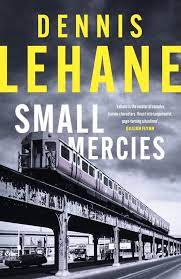Small
Mercies, by Dennis Lehane.
It
is Summer, 1974. In Boston,
Massachusetts, a judge has just decreed that public high schools be
desegregated: black teenagers will travel
by bus to white high schools – but only in the poorer areas. Prosperous suburbs with private schools will
be exempt. In the predominantly poor Irish
district of Southie racism is rearing its ugly head: if the rich want desegregation, let them bus
all the niggers to their own schools!
The mood is ugly, and there have already been demonstrations, engineered
by the local criminals; they don’t want
competition from any nigger gangs on their turf. The atmosphere is explosive, and the weather
is not helping. Everyone is feeling the
heat, not least the mayor, the judicial system, and the police: something will have to give.
Mary
Pat Fennessy is a hard woman – hard-faced, hard to like, and hard-done-by in
her personal circumstances: her first
husband, father of her children and a small-time criminal, died in suspicious
circumstances; her beloved son succumbed
to heroin’s charms and died as a result;
her second husband Ken has recently left her, and her cherished
remaining child, 17 year-old Jules, didn’t come home last night. And a young
black man has been found dead overnight in Southie, too, and the police are
making a lot of enquires.
Jules’ mutton-headed boyfriend Rum says that
he hasn’t seen her and left her to walk home by herself. Oh, really?
Rum is unprepared for Mary Pat’s ‘physicality’ when Mary Pat tracks him
down, for Mary Pat is a dirty fighter whose main advantage is surprise –
surprise and shock that a little woman could turn herself into a bone-breaker,
and in Rum’s case, a testicle-cutter – not fatal, you understand, but so
painful and bloody that Rum begs the investigating police to keep him in a cell
so that she can’t get him – and in return he’ll tell them what he and Jules did
on their last date.
Dennis
Lehane doesn’t let the reader move an inch away from the page as he holds us
all in a stranglehold of suspense, first as to Jules’ fate, then the nature of
Mary Pat’s terrible revenge. And
hubble-bubbling away like a dirty underground stream throughout this explosive
and powerful story is the racism that never goes away, never changes, and certainly
never disappears, even though fifty years have passed. This was a hard book to read, (including all
the f-bombs!) hard because of all the uncomfortable truths that it exposes,
especially about how we, as children, are taught to hate: this is a great book. SIX STARS.


